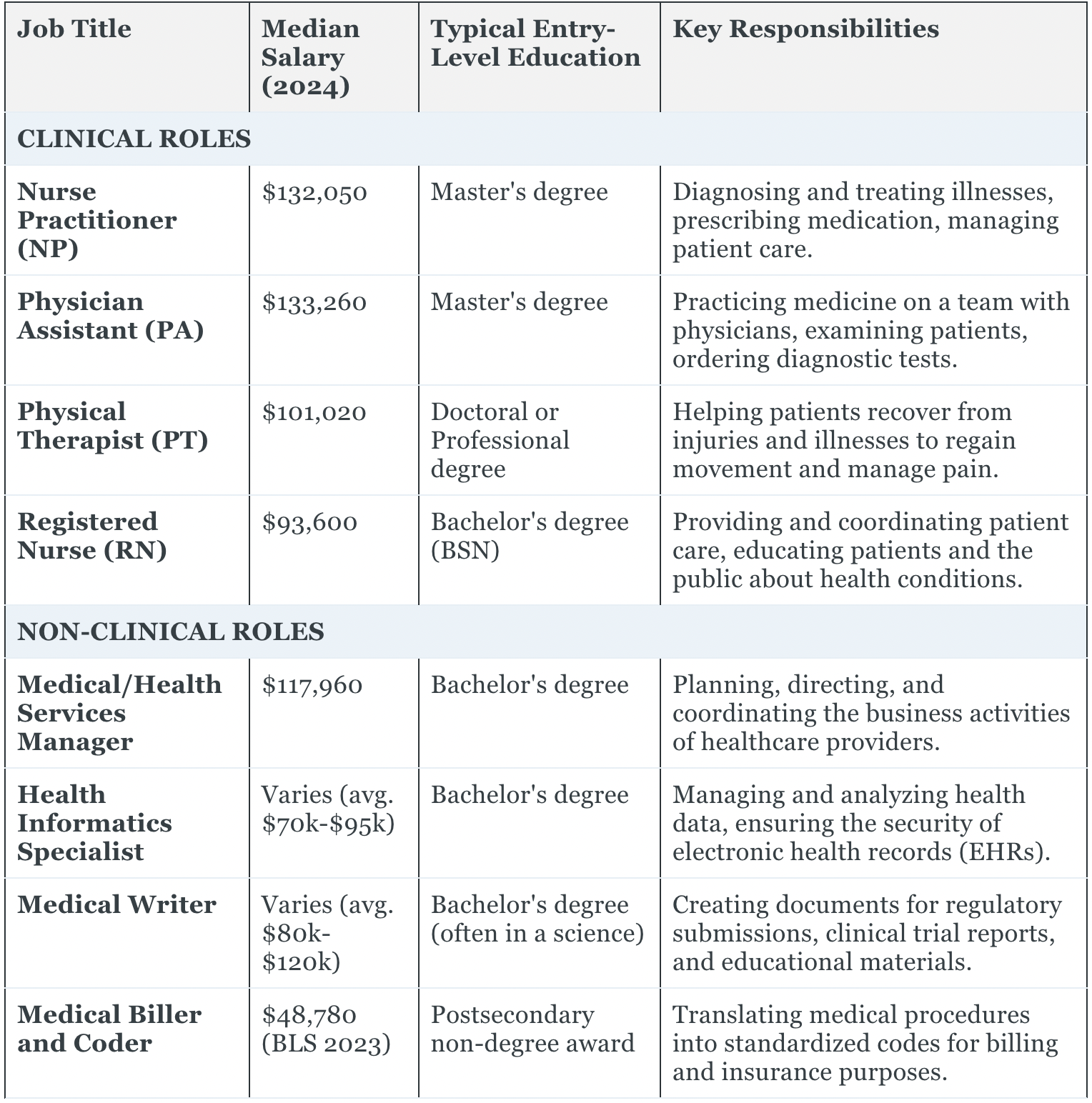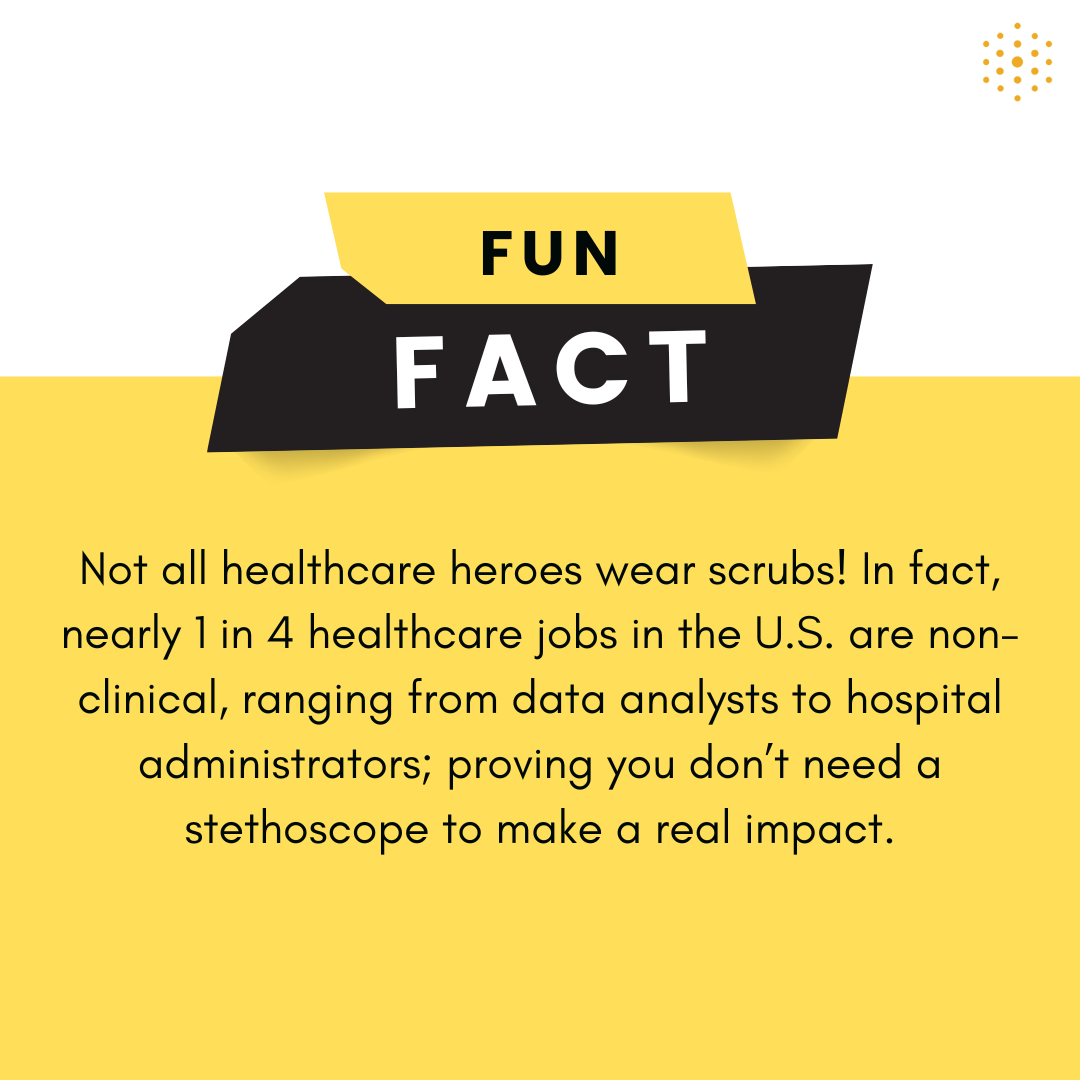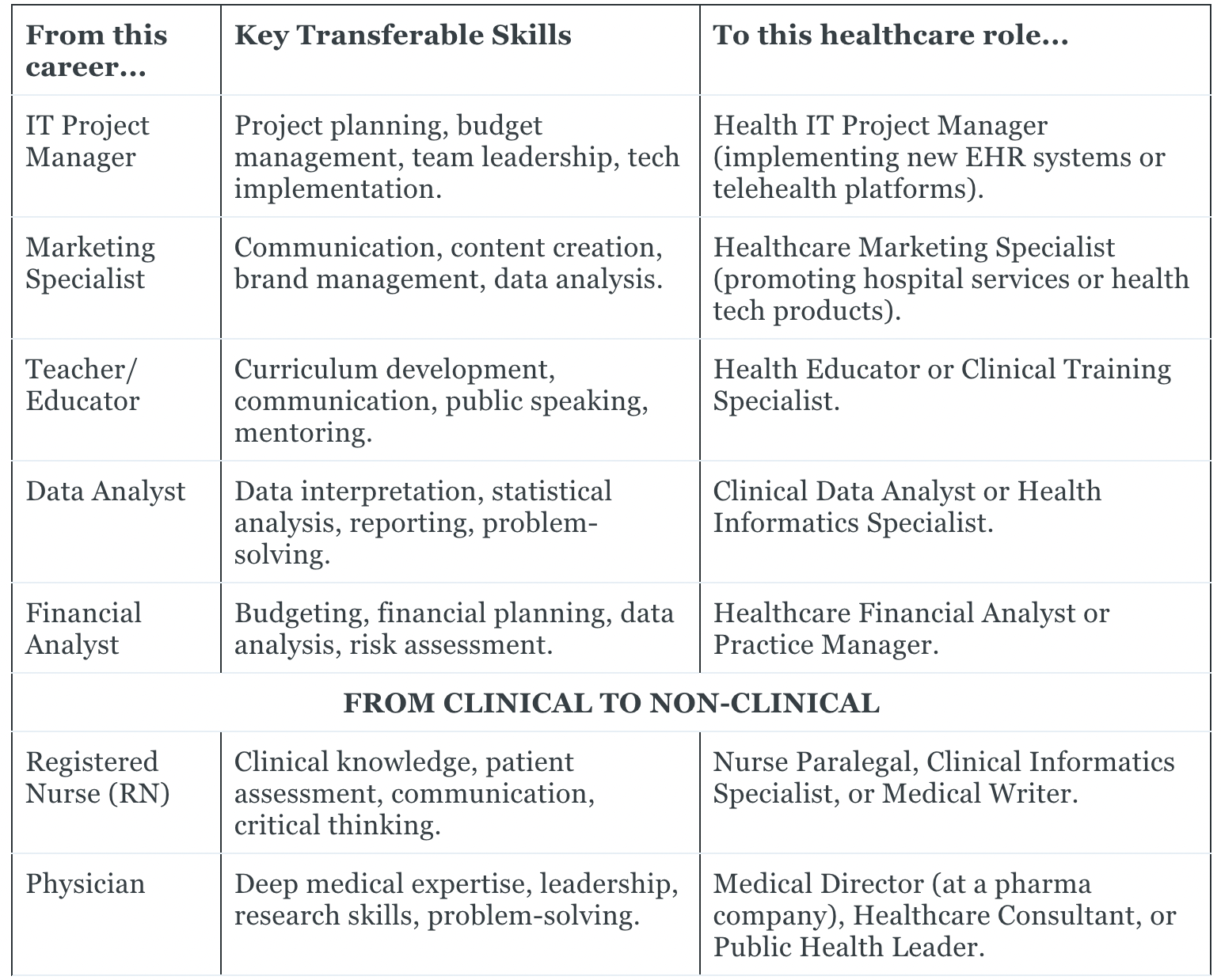According to report by BLS, healthcare is set to add 2.1 million jobs by 2032, making it one of the fastest-growing industries in the U.S.
But before chasing titles or degrees, the real first step is understanding why you want to be in this field.
Do you thrive in fast-paced settings or prefer behind-the-scenes impact? Are you driven by direct patient care, data, leadership - or something else entirely?
This guide will help you clarify your motivations, explore both clinical and non-clinical paths, navigate mid-career pivots, and map out long-term growth.
Let's dive in!
1. Find Your "Why": The First Step on Any Career Path
Before you even think about degrees or job titles, it's crucial to understand your personal motivation for pursuing a career in healthcare. Ask yourself some honest questions:
- What kind of impact do you want to make? Do you want to be on the front lines, providing direct patient care, or would you prefer to work behind the scenes, improving the systems that support that care?
- What are your core strengths? Are you a compassionate communicator, a meticulous problem-solver, or a natural leader? Taking inventory of your existing skills is a valuable first step.
- What kind of work environment energizes you? Do you thrive in a fast-paced, high-stakes setting like an emergency room, or do you prefer the structure of a research lab or an administrative office?
Your answers to these questions will be your compass, guiding you toward a career that aligns with your passions and talents.
| If you are... | You might thrive as a... | Basic Requirements |
|---|---|---|
| Compassionate and enjoy direct patient interaction | Registered Nurse (RN) | Associate's or Bachelor's degree in Nursing (ADN/BSN) and NCLEX-RN license. |
| Home Health Aide (HHA) | High school diploma or equivalent and short-term on-the-job training. | |
| Mental Health Counselor | Master's degree in counseling or psychology and state licensure. | |
| A problem-solver who excels in fast-paced environments | Paramedic/EMT | Postsecondary non-degree award and state licensure. |
| Surgical Technologist | Postsecondary non-degree award or associate's degree; certification is often preferred. | |
| Emergency Medicine Physician | Medical degree (M.D. or D.O.), residency in emergency medicine, and state licensure. | |
| Detail-oriented and enjoy research or data | Medical Laboratory Scientist | Bachelor's degree in medical technology or a life science. |
| Health Information Technician | Certificate or associate's degree in health information technology. | |
| Clinical Research Associate | Bachelor's degree in a life science; many have advanced degrees (Master's or PhD). | |
| A natural leader with strong organizational skills | Healthcare Administrator | Bachelor's degree in health administration or a related field; Master's is often preferred. |
| Clinical Manager | Clinical background (e.g., nursing) plus experience and often a Master's degree (MSN, MHA). | |
| Public Health Specialist | Bachelor's degree in a health-related field; Master of Public Health (MPH) is common. |
2. Explore the Landscape: From Clinical to Non-Clinical and Everything in Between
One of the biggest misconceptions about healthcare is that you need a clinical background to be a part of it. The reality is that the industry is a complex ecosystem of both clinical and non-clinical roles.
Clinical Roles
These are the positions that most people think of when they hear "healthcare." They involve direct patient interaction and care. Some of the most in-demand clinical roles, according to a recent Coursera report, include:
1. Nurse Practitioners (NPs): With a staggering 45% projected growth rate between 2023 and 2033, NPs are at the forefront of patient care.
2. Physician Assistants (PAs): This role is projected to grow by 28% in the same period, offering a versatile and high-paying career path.
3. Physical Therapists (PTs): With an aging population, the demand for PTs is expected to grow by 14%.
Non-Clinical Roles
These are the essential behind-the-scenes roles that keep the healthcare system running smoothly. If you're looking to leverage skills from another industry, a non-clinical role could be your perfect entry point. Consider these options:
- Healthcare Administration: These professionals manage the business side of healthcare, from hospital operations to private practice management. The U.S. Bureau of Labor Statistics (BLS) projects a 29% growth for medical and health services managers.
- Health Informatics: This field combines healthcare, information technology, and data analytics to improve patient care and operational efficiency.
- Medical and Health Writing: If you have a knack for communication, you can translate complex medical information into accessible content for patients, providers, and the public.


3. The Mid-Career Transition
It's never too late to switch to a career in healthcare. In fact, your experience in another field can be a significant asset.
A 2024 article from Northeastern University's Bouvé College of Health Sciences emphasizes that skills like project management, data analysis, and customer service are highly transferable to healthcare.
If you're considering a mid-career change, here are some key steps:
- Identify Your Transferable Skills: As mentioned earlier, take stock of what you already bring to the table. Your "soft skills" like communication, teamwork, and problem-solving are just as valuable as technical expertise.
- Research Educational Pathways: Depending on the role you're targeting, you may need to pursue additional education or certification. Many institutions like Caribbean Medical Schools, now offer accelerated programs and flexible learning options for working professionals.
- Gain Relevant Experience: Volunteering, internships, or even part-time administrative roles in a healthcare setting can provide invaluable experience and strengthen your resume.
For those with a clinical background looking for a change of pace, there's a growing demand for non-clinical roles that leverage medical expertise.
For instance, a nurse with years of patient care experience would be an excellent candidate for a role as a clinical educator, a health informatics specialist, or a patient advocate.

4. Charting Your Course for Advancement
For those already in the healthcare field, the opportunities for growth are abundant. Consider these pathways:
- Specialization: Deepen your expertise in a specific area of your field. A registered nurse, for example, could pursue certification in a specialty like oncology, critical care, or pediatrics.
- Leadership and Management: If you have strong leadership qualities, you might consider moving into a management role. This could involve leading a team of nurses, managing a specific department, or even overseeing an entire facility.
- Education and Mentorship: Share your knowledge and experience with the next generation of healthcare professionals by becoming an educator or a mentor.
- Embrace Lifelong Learning: The healthcare field is constantly evolving. Stay current with the latest research, technologies, and best practices to remain a valuable asset to your organization.
Final Thoughts
Choosing a career in healthcare isn’t just about landing a job, it’s about finding purpose, growth, and a path that truly fits.
Whether you're just starting out, making a mid-career move, or planning your next step, clarity and preparation can make all the difference.
At Hiration, we help you take that next step with confidence.
From crafting tailored, ATS-friendly resumes to practicing mock interviews and refining your LinkedIn profile, our AI-powered platform is built to support every phase of your healthcare career journey.
Start where you are. Grow where you’re meant to be.



